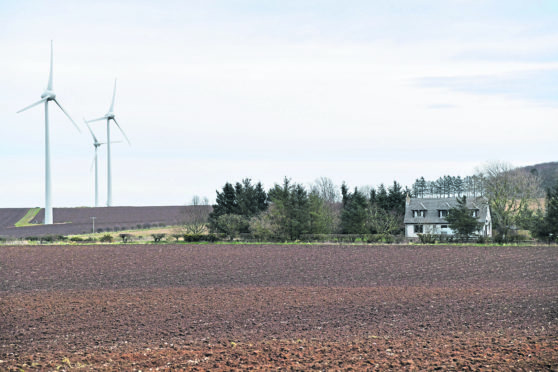A couple who claim the “jet-like” noise from three turbines ruined their life in the countryside have won a court battle to quieten them.
Andrew and Rosemary Milne’s home lies in the shadow of three 262ft turbines at West Knock, near Stuartfield.
They moved to the area from Aberdeen in 2001 to be closer to their parents, and to allow keen horsewoman Mrs Milne to spend more time preparing for competitions.
But they claim their peaceful lives were ruined when the turbines appeared in 2011 – and that it became so bad, they moved to England.
Microbiologist Mrs Milne told a court she did not have to follow her husband to Surrey, but could not bear the “whooshing” and “crashing” noises which she likened to “insidious pulsing jets”.
Aberdeenshire Council approved Stuartfield Wind Power’s plans for the three masts after considering three objections about the visual, noise and health impact they would have.
>> Keep up to date with the latest news with The P&J newsletter
Mr and Mrs Milne did not object to the development, as they were never given notice of them during the planning process.
But the couple – who had considered building their own turbine on the land by their home – became so fed up with the noise that they complained to the council, and after being unsatisfied with the impact the noise notice issued, decided to go to Aberdeen Sheriff Court to get their own order.
Mrs Milne told the court that she was out riding when the turbines were being tested, and that on two occasions, the noise was so loud and frightening her horse bolted.
Court papers say that when the turbines began operating normally, the noise could sometimes “unexpectedly drop, and having dropped, then unexpectedly resume at an intrusive level” – sometimes remaining so for days, depending on the wind.
She also said she had been forced to move out of her bedroom at the back of the house to sleep, while her husband refused to move – but was unable to leave the window open as he had done previously due to the noise.
The court papers add: “She became more upset and emotional as time went on due to the impact of the noise from the turbines on her peace of mind and quality of life.
“The noise from the turbines made Mrs Milne feel stressed, distracted, annoyed,
irritated and “on edge”. She likened the impact of the noise upon her daily life as
like being forced to listen to loud music whilst trying to concentrate on work.”
Neighbour Terry Poole also gave evidence, and told the court the constant “whooshing, graunching” noise was audible in all parts of his home even with the windows closed, television and electric fans on, day and night.
However, George Howie – director of Stuartfield Wind Power and son of landowner Albert Howie – insisted the noise of the turbines was “audible but moderate” on a windy day and said they generated no sound otherwise.
He also told the court he regularly saw local residents exercising horses and dogs along the road which runs from Stuartfield towards the turbines, and said the turbines had no impact on his own family’s farm animals, which are kept 492ft away.
Sheriff Andrew Miller found in favour of Mr and Mrs Milne.
He imposed an order which means one of the turbines must have its blade trimmed when the wind blows in a certain direction and at certain speed.
Last night, Mrs Milne said the couple – who plan to move back to Stuartfield when Mr Milne’s contract ends – were “relieved” that the case had concluded.
She said: “It affected our sleep, our enjoyment of our home indoors and outside to the point it drove us to keep pursuing some means of stopping the noise which sounds like never ending jets landing.
“We have never previously had any cause to complain about anything to this degree and with such persistence.”
Mr Howie declined to comment on the outcome of the case.
Noise abatement
A noise abatement order is usually served by a council if it’s agreed that a problem amounts to a so-called statutory nuisance.
The notices are issued under Section 80 of the Environmental Protection Act 1990, which covers Scotland and England.
The Asbo-style orders can require that the noise be either stopped entirely or limited to certain periods of the day.
Anyone who defies a noise abatement order can be reported to prosecutors and face a fine of up to £5,000 plus an extra £500 penalty for every day the offence continues.
It is up to local authorities to investigate persistent complaints and environmental health officers will try and visit a property when the noise occurs.
They will then have to form a judgement as to whether it is reasonable based on factors like volume, time, frequency and duration of the noisy activity.
If it is decided the noise is a statutory nuisance then council officers will contact the person responsible, advise them of the issue and urge them to take voluntary action.
When this is unsuccessful local authorities turn to abatement notices to have the noise stopped and prevent it happening.
